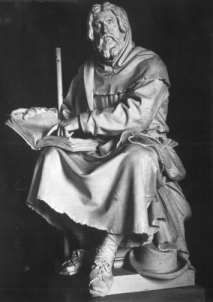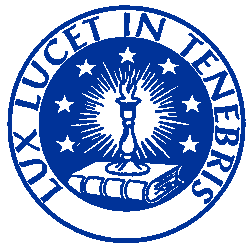4. The Waldenses
 Chronologically the Waldenses do not follow Jan Hus.
Nor do they continue where John Wyclif and the Devotio moderna left off.
The Waldenses are older than all the pre-Reformation movements named up
to now and they still exist today. Their history begins with Peter Waldo
(Valdes). Little is known about him, not even his Christian name is quite
certain. Likewise the date of his birth is not known. He lived in Lyon
and was probably a merchant.
Chronologically the Waldenses do not follow Jan Hus.
Nor do they continue where John Wyclif and the Devotio moderna left off.
The Waldenses are older than all the pre-Reformation movements named up
to now and they still exist today. Their history begins with Peter Waldo
(Valdes). Little is known about him, not even his Christian name is quite
certain. Likewise the date of his birth is not known. He lived in Lyon
and was probably a merchant.
One day he decides to lead a new and better life; that happened about
1170. He sells his possessions and with a part of the proceeds he makes
provision for his family, with another for the translation of the Bible
into the language of his country and another part he hands over to the
poor. And Waldo began to preach in the vernacular. These three actions
specify the main features of the content of the doctrine of the Waldenses,
also its piety, as it was at the beginning: poverty, the sermon in the
vernacular, the Bible.
Very soon Waldo is joined by followers who call themselves "the Poor
of Lyon". (The use of this term for the pre-Reformation Waldenses
has, as a rule, for the most part gained acceptance in research.) Preachers,
men and women(!), are sent out as travelling preachers in order to preach
this message; they are called "Barbes" (uncles). These Barbes
call on the people to repent. They are by no means the only ones who for
instance call for poverty. Besides the many church-oriented groups which
exist in Southern France there are also the "Cathari", a group
which could hardly still be called Christian. A big part of the population
sympathize with the "Poor of Lyon" and the Roman Catholic Church
supports them too from time to time and instructs, among others, the preachers
of the "Poor of Lyon" to preach against the Cathari. However
it remained a controversial question who should give instructions to preach.
In this matter the Roman Catholic Church insists on its monopoly and thus
Waldo and others are finally forbidden to preach by the Bishop of Lyon.
Waldo turns to Rome and there requests confirmation of his orthodoxy:
in vain. Nevertheless Waldo and his companions continue to preach because
they plead that they are called by a higher divine duty. For this reason
the "Poor of Lyon", together with other heretical groups, are
condemned in 1184 by Pope Lucius III. However this did not mean their
fall but their growth as an underground movement: groups of Waldenses
develop in the whole of Europe.
Central to the piety of the Waldenses is the Bible: it is heard (many
could not read) and directly applied to one's own life. Logically Waldo
encouraged a translation into the vernacular. The travelling preachers
must above all study the Bible. The teaching they take from the Bible
is simple: there is the wrong way and the right one. The right way is
that of faith corresponding to life, thus a life based on the principles
of the Sermon on the Mount. Apart from the rejection of purgatory and
the intercession for the dead the Waldenses in no way regard themselves
as heretical; they also stress this again and again: as far as the interpretation
of the sacraments, the ordination of priests, faith and practice are concerned
there is no difference of opinion to the Roman Catholic teaching. At the
most, the central position taken by the sacrament of Confession, as a
connecting link between the individuals in the community, is conspicuous.
 In
1218 a unification of the groups of Waldenses which were drifting apart
is achieved. Because of the increasingly intense persecution a lot of
Waldenses retreat to the valleys of the Cottian Alps. There, in the valleys
which could only be reached with difficulty (to the west of Turin, near
the present day French border; the most well-known place is Torre Pellice),
the Waldenses were able to survive despite severe persecution, now and
then outwardly conforming. About 1530 the Waldenses took up contact with
the Reformed Protestant reformer Wilhelm Farel and in 1532 officially
joined the Reformation at the Synod of Chanferan.
In
1218 a unification of the groups of Waldenses which were drifting apart
is achieved. Because of the increasingly intense persecution a lot of
Waldenses retreat to the valleys of the Cottian Alps. There, in the valleys
which could only be reached with difficulty (to the west of Turin, near
the present day French border; the most well-known place is Torre Pellice),
the Waldenses were able to survive despite severe persecution, now and
then outwardly conforming. About 1530 the Waldenses took up contact with
the Reformed Protestant reformer Wilhelm Farel and in 1532 officially
joined the Reformation at the Synod of Chanferan.
While doing so the Waldenses adopted ideas from the Reformation (e.g. only two sacraments; the repeal of celibacy, their own church buildings etc.). From their own point of view the Waldenses, who make up the Reformed Protestant Church in Italy today, stress a continuity reaching back to their beginning at the time of Peter Waldo. (For the present day situation of the Waldenses in Italy cf. Lesson 5.)
Peter Waldo most certainly belongs to the Pre-Reformation reformers. Early on he pointed to the central position of the Bible. And to the fact that one "must obey God more than men"; after all two quite central ideas of the Reformation. These convictions which remained kindled throughout all the years of the Waldenses movement, even when underground, then made it easy for the Waldenses to regard that part of the Reformation which was of Reformed Protestant character as a continuation of their own teaching.